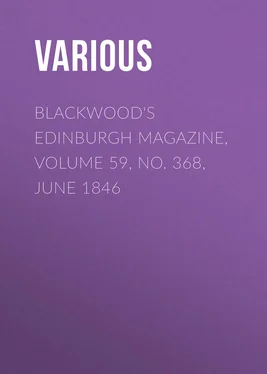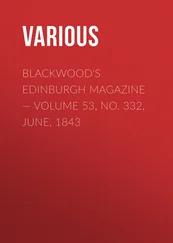Various - Blackwood's Edinburgh Magazine, Volume 59, No. 368, June 1846
Здесь есть возможность читать онлайн «Various - Blackwood's Edinburgh Magazine, Volume 59, No. 368, June 1846» — ознакомительный отрывок электронной книги совершенно бесплатно, а после прочтения отрывка купить полную версию. В некоторых случаях можно слушать аудио, скачать через торрент в формате fb2 и присутствует краткое содержание. Издательство: Иностранный паблик, Жанр: periodic, foreign_edu, Путешествия и география, на английском языке. Описание произведения, (предисловие) а так же отзывы посетителей доступны на портале библиотеки ЛибКат.
- Название:Blackwood's Edinburgh Magazine, Volume 59, No. 368, June 1846
- Автор:
- Издательство:Иностранный паблик
- Жанр:
- Год:неизвестен
- ISBN:нет данных
- Рейтинг книги:5 / 5. Голосов: 1
-
Избранное:Добавить в избранное
- Отзывы:
-
Ваша оценка:
- 100
- 1
- 2
- 3
- 4
- 5
Blackwood's Edinburgh Magazine, Volume 59, No. 368, June 1846: краткое содержание, описание и аннотация
Предлагаем к чтению аннотацию, описание, краткое содержание или предисловие (зависит от того, что написал сам автор книги «Blackwood's Edinburgh Magazine, Volume 59, No. 368, June 1846»). Если вы не нашли необходимую информацию о книге — напишите в комментариях, мы постараемся отыскать её.
Blackwood's Edinburgh Magazine, Volume 59, No. 368, June 1846 — читать онлайн ознакомительный отрывок
Ниже представлен текст книги, разбитый по страницам. Система сохранения места последней прочитанной страницы, позволяет с удобством читать онлайн бесплатно книгу «Blackwood's Edinburgh Magazine, Volume 59, No. 368, June 1846», без необходимости каждый раз заново искать на чём Вы остановились. Поставьте закладку, и сможете в любой момент перейти на страницу, на которой закончили чтение.
Интервал:
Закладка:
But if we are to be answered by a class, plethoric with wealth and rank; that literature ought to be content with living on its own means; must not the obvious answer be – Is the author to be an author, down to his grave? Is there to be no relaxation of his toil? is there to be no allowance for the exhaustion of his overworked faculties? for the natural infirmities of years? for the vexations of a noble spirit compelled to submit to the caprices of public change? and with its full share of the common calamities of life, increasing their pressure at once by an inevitable sense of wrong, and by a feeling that the delight of his youth must be the drudgery of his age? When the great Dryden, in his seventieth year, was forced, in the bitterness of his heart, to exclaim, "Must I die in the harness!" his language was a brand on the common sense, as well as on the just generosity, of his country. We now abandon the topic with one remark. This want of the higher liberality of the nation has already produced the most injurious effects on our literature.
All the great works of our ancestral literature were the works of leisure and comparative competence. All the great dramatic poetry of France was the work of comparative competence. Its writers were not compelled to hurry after the popular tastes; they followed their own, and impressed its character upon the mind of the nation. The plays of Racine, Corneille, Molière, and Voltaire, are nobler trophies to the greatness of France than all the victories of Louis the XIV., than Versailles, than all the pomps of his splendid reign. Louis Philippe has adopted the same munificent policy, and it will be followed by the same honour with posterity. But, in England, the keeping of a stud of racehorses, the building of a dog-kennel, or the purchase of a foreign picture, is ignominiously and selfishly suffered to absorb a larger sum than the whole literary patronage of the most opulent empire that the sun ever shone upon. We recommend these considerations to Lord Brougham: they are nobler than politics; they are fitter for his combined character of statesman and philosopher; they will also combine with that character another which alone can give permanency to the fame of any public man – that of the philanthropist. His ability, his knowledge of human nature, and his passion for public service – qualities in which his merits are known to Europe – designate him as the founder of a great system of public liberality to the enterprise of genius. And when party is forgotten, and cabinets have perished; when, perhaps, even the boundaries of empire may have been changed, and new nations rise to claim the supremacy of arts and arms; the services of the protector of literature will stand out before the eye with increased honour, and his name be rescued from the common ruin which envelopes the memory of ostentatious conquerors and idle kings.
The present volume contains biographies of Johnson, Adam Smith, Lavoisier, Gibbon, Sir Joseph Banks, D'Alembert. We shall commence with the lives less known to the generality of readers than those of our great moralist and great political economist, reserving ourselves for sketches of their career, as our space may allow.
Lord Brougham commences his life of Sir Joseph Banks by a species of apology, for placing in the ranks of philosophers a man who had never written a book. But no one has ever doubted that a man may be a philosopher, without being an author. Some of the greatest inventions of philosophy, of science, and of practical power, have been the work of men who never wrote a book. In fact, the inventor is generally a man of few words; his disciples, or rivals, or imitators, are the men of description. The inventor gives the idea, the follower gives the treatise; but the inventor is the philosopher after all. The question, however, with Sir Joseph Banks is, whether he was any more an inventor than a writer. It does not appear that he was either. Of course, he has no right to rank among men of science. But he had merits of his own, and on those his distinctions ought to have been placed. He was a zealous, active, and influential friend of philosophers. He gave them his time, he received them in his house, and he assisted their progress. He volunteered to be the protector of their class; he sympathised with their pursuits; and, while adding little or nothing to their discoveries, he assisted in bringing those discoveries before the world. He loved to be thought the patriarch of British science; and, like the patriarch, he retained his authority even when he was past his labour. If he filled the throne of science feebly, none could deny that he filled it zealously. The true definition of him was, an English gentleman occupying his leisure with philosophical pursuits, and encouraging others of more powerful understanding to do the same.
Sir Joseph Banks was of an old and wealthy family, dating so far back as Edward III.; first settled in the West Riding of Yorkshire, and afterwards in the county of Lincoln. He was born in London in January 1743. At the age of nine he was sent to Harrow, and at thirteen to Eton, where the tutors observed, as has happened in many other instances, that he was fonder of play than of books. In about a twelvemonth, however, he became studious, though not to the taste of his schoolmasters. The origin of this change was described by himself, in a letter to Sir Everard Home, as accidental. One afternoon he had been bathing with some of the Eton boys, and, on returning to dress himself, found that they had left him alone. Walking down a green lane, whose sides exhibited the wild-flowers of the season, the thought occurred to him, how much more natural and useful would be the knowledge of plants, than of Greek and Latin. From this time he devoted himself to the study of botany, though still continuing that of the classics. On returning to his father's house, he found a copy of Gerard's Herbal , which fixed his taste. He now added to his collecting of plants that of butterflies and other insects. Lord Brougham mentions that his father was one of Banks's associates at this period, and that they employed themselves together in natural history.
Natural history has been so frequently the pursuit of studious triflers, that it is difficult to exempt it from the charge of trifling. To gather plants which have been gathered a thousand times before, to ascertain their names from an herbal, and classify them according to its list, seems to be little more than a grave apology for playing the fool. A determination to gather all the butterflies and blue-bottles within the limits of the realm, certainly has nothing that can dignify it with the name of scientific pursuit. The collecting of pebbles and shells, or even the arranging of animals in the cases of a museum, are accomplishments of so easy an order, and of so little actual use, that they serve for little else than to wile away the time. But this trifling assumes a more important shape when it rises to the acquisition of actual knowledge; when, instead of classifying plants, it develops their medicinal virtues, and, instead of embalming animals, it examines their structure, as throwing light on the conformation or diseases of man.
But Sir Joseph Banks was fortunately relieved from subsiding into this foppery, by circumstances which forced him into vigorous and useful exertion. An approaching transit of Venus had been long looked to, as giving an opportunity for ascertaining the distance of the sun from the earth. It was recommended, that observations on this phenomenon should be made from different stations on the globe. Accordingly, in 1761, the British government sent out two observers, one to the Cape and the other to St Helena. The French government at the same time sent out three – to Pondicherry, Siberia, and the Mauritius. But the weather was unfavourable, and the observations were to be regarded as a failure. But there was a second transit in 1769, and the leading powers of Europe sent out observers; England sending a vessel to the South Seas, an observer to India, and two to Hudson's Bay. Captain Wallace having lately made several discoveries in the Pacific, public attention had been strongly drawn to that hitherto scarcely known portion of the globe. The celebrated Captain Cook was appointed commander, and Sir Joseph Banks, stimulated by an honourable zeal and a rational desire of knowledge, obtained leave from his friend, Lord Sandwich, to join the expedition. He took with him Dr Solander the botanist, and two draughtsmen.
Читать дальшеИнтервал:
Закладка:
Похожие книги на «Blackwood's Edinburgh Magazine, Volume 59, No. 368, June 1846»
Представляем Вашему вниманию похожие книги на «Blackwood's Edinburgh Magazine, Volume 59, No. 368, June 1846» списком для выбора. Мы отобрали схожую по названию и смыслу литературу в надежде предоставить читателям больше вариантов отыскать новые, интересные, ещё непрочитанные произведения.
Обсуждение, отзывы о книге «Blackwood's Edinburgh Magazine, Volume 59, No. 368, June 1846» и просто собственные мнения читателей. Оставьте ваши комментарии, напишите, что Вы думаете о произведении, его смысле или главных героях. Укажите что конкретно понравилось, а что нет, и почему Вы так считаете.












